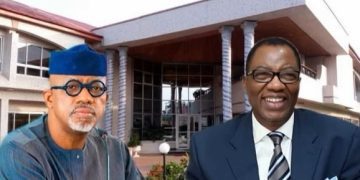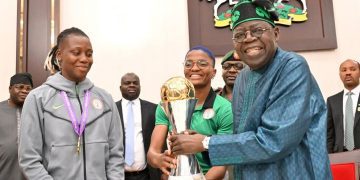By Jane Okafor, Abuja
The Senate has cautioned Pastor Tunde Bakare against pouring his frustrations on the 10th National Assembly through what it termed his Easter Sunday “political ecumenical homily,” stressing that neither the Federal Legislators nor the institution they represent should be blamed for whatever it is that pains the preacher.
The Chairman of the Senate Committee on Media and Public Affairs, Yemi Adaramodu, in a written response on Tuesday to Bakare’s corrosive aspersions, including “sweeping generalisations and disparaging commentary aimed at the institution of the National Assembly,” said the nation’s democracy can best be nurtured through thoughtful contributions that inspire reform, not resentment.
Adaramodu also charged the fiery preacher to always back his criticisms with facts.
According to him, the Senate decided to respond when cleric’s remarks border on “unwarranted invective and misleading assertions.”
The Senate Spokesman noted that the challenges facing the country require dialogue anchored on truth, mutual respect, and a commitment to nation-building — not polarising rhetoric that undermines confidence in the democratic institutions.
He said, “Pastor Bakare, a cleric and political voice in his own right, has previously contributed to national discourse in ways that have spurred reflection and debate.
“However, his most recent statements veer away from constructive criticism into rhetoric, unfortunately laced with contempt and unsubstantiated claims.
“It is also important to acknowledge that Pastor Bakare was a presidential aspirant in the last general elections and a vice-presidential candidate in a previous electoral cycle.
“We view his corrosive criticisms of the National Assembly as a biased and political ecumenical homily.
“While he remains a respected cleric, his role as a prominent political figure cannot be discounted when assessing the lens through which his comments are made.
“His position as a political leader influences the context of his statements, which are not only reflections of personal views but also carry significant political implications.
“We also wish to note that Pastor Bakare is not only a cleric and political figure but also one with a legal background.
“He is, therefore, well aware of the constitutional boundaries that guide public commentary—particularly on matters that are sub judice.
“The National Assembly cannot and will not be drawn into responding to issues that are already before a court of competent jurisdiction, out of respect for the rule of law and the independence of the judiciary.
“While some may attempt to portray an unnecessary adversarial dynamic between the National Assembly and the Executive arm of government as a marker of virility in checks and balances, we must clarify that such tension, though it may entertain some, does not necessarily equate to effective legislative oversight.
“The true test of institutional maturity lies not in performative hostility but in principled engagements and results-driven processes.
“Indeed, there are well-documented instances where the National Assembly has constructively disagreed with the Executive — including on specific provisions of the presidential declaration on the Rivers State state of emergency, which Pastor Bakare referenced.
“These examples reflect our commitment to constitutionalism and fidelity to the Nigerian people — not posturing for effect.
“It’s noteworthy that the Executive has never brought any unconstitutional agenda before the 10th National Assembly, unlike the infamous Third Term agenda, the rejection of which the Pastor used as a benchmark for performance.
“To cast aspersions on the entire institution based on personal frustrations, ideological differences, or as positioning ahead of possible future political alignments, is not only unfair but also counterproductive to our collective democratic journey.
“The challenges facing our country require dialogue anchored on truth, mutual respect, and a commitment to nation-building — not polarising rhetoric that undermines confidence in our democratic institutions.”
The Senate Spokesman further stated, “It is important to note that Pastor Bakare may have, in times past, similarly directed harsh criticisms at previous sessions of the National Assembly — some of which he now praises in glowing terms.
“We are confident that, in time, with a nuanced review of the performance of the 10th National Assembly—within the context of the exigencies of this time and season—Pastor Bakare may, at some point in the future, commend us for acting in the best interest of the people of Nigeria, in line with our constitutional mandate.
“The Senate remains open to engaging with all Nigerians—including Pastor Bakare — in the spirit of constructive engagement. It is through such dialogue, not a diatribe, that we can advance the cause of good governance and national development.
“We urge all public figures — especially those with influence in the civic and spiritual spheres — to temper their criticisms with facts and a sense of national responsibility. Our democracy, though imperfect, is best nurtured through thoughtful contributions that inspire reform, not resentment.”








































